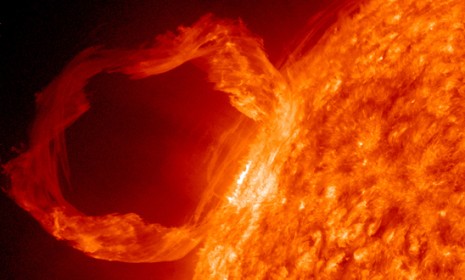Can a 'killer' solar flare really destroy Earth?
A few 2012 doomsayers think the sun will fry our planet to a crisp

A free daily email with the biggest news stories of the day – and the best features from TheWeek.com
You are now subscribed
Your newsletter sign-up was successful
Early in November a powerful solar flare erupted from the sun's surface and, according to NASA, "triggered some disruption to radio communications on Earth." But could a "killer" solar flare streak through space and burn our planet to a crisp? It certainly seems like a popular idea among harbingers of a world-ending apocalypse in 2012. Here's what you should know:
First things first: What is a solar flare?
A solar flare is a "powerful release of energy that brightens the sun," says Clara Moskowitz at Space.com, and is usually "associated with an area of increased magnetic activity on the solar surface." The discharges whip out from the sun's surface at breakneck speeds, producing temperatures in the millions of kelvins and emitting radiation all across the electromagnetic spectrum. The largest flares can reach lengths exponentially longer than the diameter of our planet.
The Week
Escape your echo chamber. Get the facts behind the news, plus analysis from multiple perspectives.

Sign up for The Week's Free Newsletters
From our morning news briefing to a weekly Good News Newsletter, get the best of The Week delivered directly to your inbox.
From our morning news briefing to a weekly Good News Newsletter, get the best of The Week delivered directly to your inbox.
So is Earth in danger of being incinerated?
Not really. While electromagnetic fluctuations from solar flares can disrupt satellites, interrupt power grids, or jam communication equipment, "there simply isn't enough energy in the sun to send a killer fireball 93 million miles to destroy Earth," says NASA. The real danger is for pilots and astronauts who rely on satellite transmissions to carry out their operations — and it's why NASA issues warnings when a big solar storm (like the one expected in 2012) is coming.
So why are all the doomsayers worked up?
For believers in an imminent apocalypse, 2012 is a big year. It marks the end of the Mayan calendar and, some say, the end of the world. Some 2012-believers think it more than coincidence that solar flares are making headlines, and reckon they'll be the instrument of Earth's destruction. But the recent uptick in activity is actually just the sun revving up its standard 11-year activity cycle, says Edward Moyer at CNET. "And though the solar-activity cycle is indeed picking up steam," the sun will settle down after it peaks "in late 2013 or early 2014 — not 2012."
A free daily email with the biggest news stories of the day – and the best features from TheWeek.com
-
 Political cartoons for February 18
Political cartoons for February 18Cartoons Wednesday’s political cartoons include the DOW, human replacement, and more
-
 The best music tours to book in 2026
The best music tours to book in 2026The Week Recommends Must-see live shows to catch this year from Lily Allen to Florence + The Machine
-
 Gisèle Pelicot’s ‘extraordinarily courageous’ memoir is a ‘compelling’ read
Gisèle Pelicot’s ‘extraordinarily courageous’ memoir is a ‘compelling’ readIn the Spotlight A Hymn to Life is a ‘riveting’ account of Pelicot’s ordeal and a ‘rousing feminist manifesto’